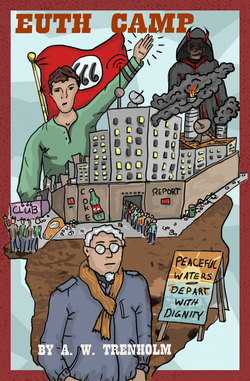Читать книгу Euth Camp - A.W. Trenholm - Страница 11
На сайте Литреса книга снята с продажи.
Оглавление6. The Second Beast
The two rulers had been jockeying their way into world positions for some years, but certain events had catapulted them into power: the worldwide collapse of all national currencies as the medium of exchange, several large banks folding, and stocks failing. But the real seal of world approval on them came when they brokered the seven-year peace settlement in Jerusalem. It had seemed shaky at first but it held together. These two men nursed it along for a full three-and-a-half years.
The Second Guardian had at first been in the shadows, but from the time that they negotiated the historic peace deal in Jerusalem, he became more of a public figure. I suspected that somehow he had gained access to a military satellite armed with the latest in laser equipment, because he put on a spectacular public demonstration of the power of the god of forces by bringing fire down from the sky, striking specific targets and people.
Just as the Bible predicted, at the halfway point of the seven-year covenant the Beast was killed by a deadly wound to his head, and by satanic workings and power, he was raised to life again. This man’s death and resurrection caused no small stir among religious leaders, especially since it happened in Jerusalem during a great public gathering. His healing from this deadly wound confirmed in many people’s minds that he was indeed a supernaturally gifted individual. Some claimed that his resurrection was a sign that he had been sent to the earth to usher in a new era, others said he was the long awaited messiah, others said he was Jesus returned to judge the world and bring peace. That he received a notable miracle no one could deny, and he, of course, credited his healing to the god of forces and insisted that everyone should worship his deity. That is when the saying “Who is like unto the Beast? Who is able to make war with him?” came into popular usage.12
After the assassination attempt, the Beast spoke strongly against the covenant, saying that old religious beliefs needed to be eradicated to truly make it possible for any new ideas to take hold. Everyone needed to be free to embrace an entirely new world order, and we needed an entirely new mindset to embrace a new way of doing business. His position hardened against all religions, and he declared that all religious literature be banned and burned. He declared war on religions, especially Christians, because it was supposedly a Christian extremist who had shot him in the head, claiming that he was the Antichrist. He decreed that books like the Bible were evil, perpetuating the mistakes of the past. They were homophobic, intolerant, old-fashioned, out of date, and against the principles of world peace. He proposed that everyone worship the god of forces, a god that we could see in action.
The Bible spoke of a second beast called “the False Prophet.” And we saw that, as predicted, the second beast worked to cause everyone to worship the Beast and make them receive a mark in their right hand or forehead in order to buy and sell.13 He seemed to complete the unholy trinity of the beastly government. There was Satan behind the whole scheme, acting like a father giving his power and authority to his two sons. Satan seemed to be trying to imitate the life, death and resurrection of Jesus Christ.
Without the previous guideposts the world had had for markers, the people couldn’t see their way out of the fog of confusion and chaos. The beastly brothers seemed to have incredibly persuasive ways to get people to follow them—if their words and promises of peace and personal prosperity didn’t work, then their dreadful use of force would. The Guardian’s “bee squad” would sweep in and pillage all private collections of wealth, be it art, sculpture, gold plated statues, whatever, declaring it a part of the international treasury. He called them his equalizers, but people unofficially referred to them as the Huns, because they were like the barbarians who had sacked the Roman Empire. In theory his system was reminiscent of the ideals of communism, but in actual practice it was a breeding ground for corruption, bribery, extortion and theft because it had one very weak link in its utopian sounding chain of idealism, and that was the degenerated and self-serving hearts of people.
